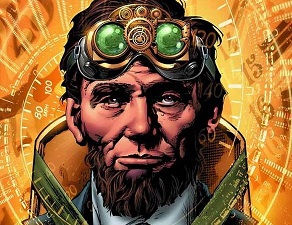 Your standard American History textbook will tell you that after First Bull Run, the Union realized the War was going to be a bit trickier than they’d thought, and began preparing more substantially. The South, on the other hand, felt validated in their assessment of the Yanks and suffered from overconfidence.
Your standard American History textbook will tell you that after First Bull Run, the Union realized the War was going to be a bit trickier than they’d thought, and began preparing more substantially. The South, on the other hand, felt validated in their assessment of the Yanks and suffered from overconfidence.
Both are partly true, but the pragmatic oversimplification necessary in any high school history course creates false clarities. Nothing’s ever as straightforward as we teach it, or as unequivocal as the teenage mind demands. History involves too many people and groups thereof, and people are messy and weird.
In an effort to spotlight some of that complication, I supplement the basics of Bull Run with two short video clips involving a very different military situation. I’m going to argue that First Bull Run, its unfolding, and its results, shaped the Civil War more dramatically and for far longer than its strategic importance or body count suggested.
Clip the First:
[[{“type”:”media”,”view_mode”:”media_small”,”fid”:”726″,”attributes”:{“alt”:””,”class”:”media-image”,”typeof”:”foaf:Image”}}]]
OK, quiz time. In this excerpt, who does the Black Knight represent?
*tick*
*tick*
*tick*
*tick*
*BUUZZZZZZZZZZZZZZ* Time’s up!
The answer is… ‘The South’.
 The vanity and honor culture of the South was pretty much unbearable long before First Bull Run, but their routing of the North after such build-up and so many supposed disadvantages reinforced the conviction of many Secesh that they simply could not, would not, should not lose – ever ever ever ever.
The vanity and honor culture of the South was pretty much unbearable long before First Bull Run, but their routing of the North after such build-up and so many supposed disadvantages reinforced the conviction of many Secesh that they simply could not, would not, should not lose – ever ever ever ever.
Ever.
They didn’t quit when behind. They didn’t quit when outnumbered. They didn’t quit when outgunned, outspent, outsupplied, or outlasted. Because THEY BELIEVED.
There’s something to be said for that sort of conviction. Lesson #1 in talking to a member of the opposite sex (or, you know… whoever you happen to be into) for the first time is “be confident.” You don’t need to be cocky, but if you approach them worried you’re going to look like an idiot, or say the wrong thing, or otherwise tank… guess what?
How many books would never have been written, temples never have been built, or blogs never posted if their creators let doubt win the day? (I, for one, am simply brimming with insecurity and self-loathing. Surely you’ve wondered about the constant overcompensating?) You can’t let uncertainty shape ALL of your choices.
But some refuse to let doubt shape ANY of their choices. You know those folks who try out for American Idol or other talent-based exploitations, who suck horribly but audition over and over and over and over and over, passionately proclaiming without irony that the world MUST HEAR THEIR SONG?
They believe.

As they’re dragged away in handcuffs, proclaiming they ARE the next American Idol, they still believe.
Those motivational posters about noteworthy peeps in history who failed a half-zillion times before doing something memorable? They believed.
Those momma monkeys who keep fighting the tiger even after they’re clearly losing so much blood they can’t possibly –
Well, you get the idea.
 Here’s the problem with that kind of enemy: they don’t give up. I mean, I’m a big fan of all that ‘hold on tight to your dreams’ stuff, but there’s a time to make like Elsa and let it go.
Here’s the problem with that kind of enemy: they don’t give up. I mean, I’m a big fan of all that ‘hold on tight to your dreams’ stuff, but there’s a time to make like Elsa and let it go.
But not the South.
There’s a parallel of this in the 20th century – Japan in World War II. We’d fire-bombed Tokyo, killing something like 100,000 men, women, and children, and with such intensity that ‘fire tornados’ became a thing, incinerating thousands more. Their rivers were clogged with charred corpses, but leadership still believed. Defeat was not an option, even when defeated.
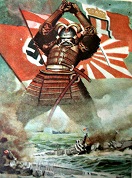 Germany took a pretty severe beating before Hitler’s suicide opened the door to surrender, leaving Japan alone in the fight – but they couldn’t let themselves accept the inevitable. WE DROPPED AN ATOMIC BOMB ON THEM, and they were still, like “I dunno – seems to me we can still make this work.”
Germany took a pretty severe beating before Hitler’s suicide opened the door to surrender, leaving Japan alone in the fight – but they couldn’t let themselves accept the inevitable. WE DROPPED AN ATOMIC BOMB ON THEM, and they were still, like “I dunno – seems to me we can still make this work.”
In order to end the war, Japan had to be destroyed in ways previously unconceived – ways still debated three-quarters of a century later.
Like the Black Knight, the South couldn’t be “defeated”. They had to be absolutely ruined, crippled, maimed by the North – played here by Arthur, King of the Britains.
THAT shaped the course of the Civil War. THAT shaped a large part of the country for a century AFTER the war. In case you haven’t followed the news lately, there are some still fighting parts of this war – albeit with rhetoric and political maneuvering in the name of tradition and faith.
“It’s only a flesh wound.”
Clip the Second:
[[{“type”:”media”,”view_mode”:”media_small”,”fid”:”727″,”attributes”:{“alt”:””,”class”:”media-image”,”typeof”:”foaf:Image”}}]]
Here’s Quiz Number Two. Ready?
In this clip, who does King Arthur represent?
*tick*
*tick*
*tick*
*tick*
*BUUZZZZZZZZZZZZZZ* Time’s up!
The answer is… ‘The North’.
(Seriously, I like, JUST said that. Why would it change? If you missed that despite my having just said it, congratulations – you’re my students.)
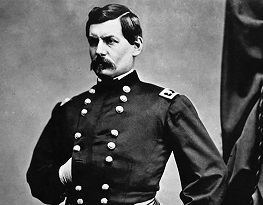 If Bull Run left the South feeling confirmed in their invulnerability, it left the North soiling their armor at rabbits. Yes, the President and co. dug in for a real war, but the psychological impact of blowing a ‘sure thing’ – so much so that they skulked back to Washington in terror and shame – didn’t fade quickly. Add to this the grand delusions of General George B. McClellan, who led Union troops through much of the first part of the war – and we have a problem.
If Bull Run left the South feeling confirmed in their invulnerability, it left the North soiling their armor at rabbits. Yes, the President and co. dug in for a real war, but the psychological impact of blowing a ‘sure thing’ – so much so that they skulked back to Washington in terror and shame – didn’t fade quickly. Add to this the grand delusions of General George B. McClellan, who led Union troops through much of the first part of the war – and we have a problem.
McClellan was so very good at so many things, but initiative was not one of them. When forced to fight, he would – apparently pretty well. When left up to him, however, the North was never quite ready.
This is ironic, because that was one of the things McClellan was best at – training, organizing, preparing. Heck, he couldn’t get enough of it. But when he had 100,000 men he was sure the enemy had 150,000 (when in reality it was more like 70,000). When he had positioning, surprise, and the technological edge, he was sure they had managed something to thwart him before he’d even begun.
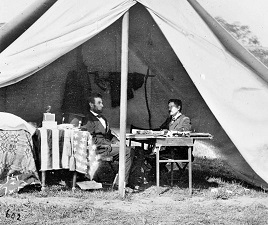 You’d think this would mean less bloodshed, but in reality it protracted the conflict unnecessarily for months – maybe years. It drove Lincoln crazy, despite his calm veneer – at one point he wrote to McClellan asking if perhaps he could borrow the army for a time, seeing as how he wasn’t using it for anything.
You’d think this would mean less bloodshed, but in reality it protracted the conflict unnecessarily for months – maybe years. It drove Lincoln crazy, despite his calm veneer – at one point he wrote to McClellan asking if perhaps he could borrow the army for a time, seeing as how he wasn’t using it for anything.
Good times.
McClellan was eventually replaced by less capable but more willing men, who did horrible things bravely but badly. Better McClellan had taken the initiative so at least horrible things could have been done well, and quickly.
The name we’ll eventually remember as saving the Union was not McClellan, but Grant – Ulysses S., to be precise. We’ll skip over to him next time.
RELATED POST: “Here’s Your Mule,” Part One – North vs. South
RELATED POST: “Here’s Your Mule,” Part Two – Slavery & Sinners
RELATED POST: “Here’s Your Mule,” Part Three – That Sure Was Sumter
RELATED POST: “Here’s Your Mule,” Part Four – On To Richmond!
RELATED POST: “Here’s Your Mule,” Part Five – Bull Run Goes South
RELATED POST: “Here’s Your Mule,” Part Seven – Grant Me This
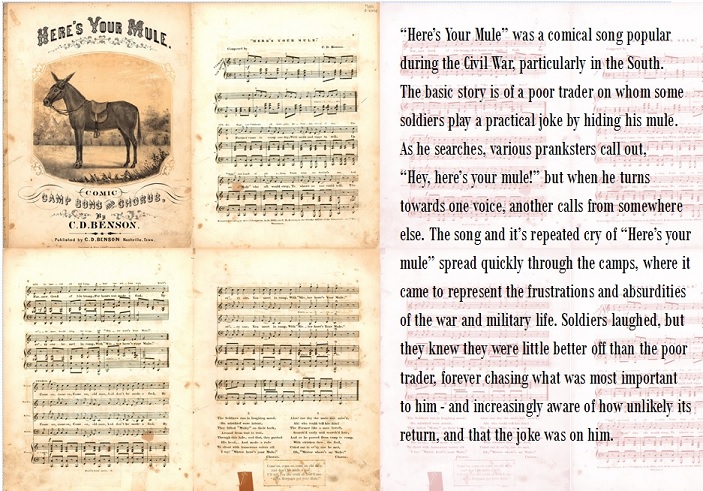


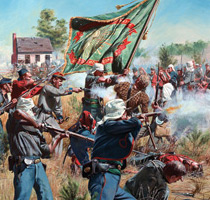 Through the smoke and haze of battle, the boys who would later be in blue could tell fresh troops were falling into place across the way. Those looking behind for their own reinforcements were… disappointed.
Through the smoke and haze of battle, the boys who would later be in blue could tell fresh troops were falling into place across the way. Those looking behind for their own reinforcements were… disappointed. 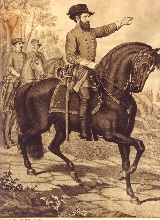 OK, he was already weird before the battle. A brilliant strategist, Jackson was nonetheless an unlikely leader of men. He was socially awkward, and his classes at Virginia Military Institute were notorious for their tedium.
OK, he was already weird before the battle. A brilliant strategist, Jackson was nonetheless an unlikely leader of men. He was socially awkward, and his classes at Virginia Military Institute were notorious for their tedium.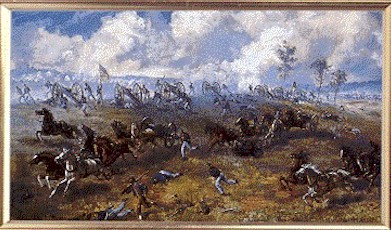 It was THIS figure who confronted the men who’d begun to fall back in the face of superior firepower. Jackson didn’t yell, so his voice would have been raised only in order to be heard above the din. He told them to form a line and hold it.
It was THIS figure who confronted the men who’d begun to fall back in the face of superior firepower. Jackson didn’t yell, so his voice would have been raised only in order to be heard above the din. He told them to form a line and hold it.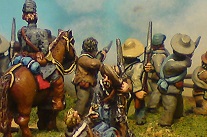 General Bee, who was not particularly weird OR inspiring, saw this from across the way and recognized its power. Knowing he couldn’t pull it off personally, he instead pointed it out to his men: “Look! There’s Jackson, standing like a stone wall! Rally behind the Virginians!”
General Bee, who was not particularly weird OR inspiring, saw this from across the way and recognized its power. Knowing he couldn’t pull it off personally, he instead pointed it out to his men: “Look! There’s Jackson, standing like a stone wall! Rally behind the Virginians!”  First Bull Run was the first time Union troops would experience one of the more bone-chilling elements of the Civil War. This was possibly Jackson’s doing as well. (Hey, once you’ve got a cool nickname, anything is possible.)
First Bull Run was the first time Union troops would experience one of the more bone-chilling elements of the Civil War. This was possibly Jackson’s doing as well. (Hey, once you’ve got a cool nickname, anything is possible.) 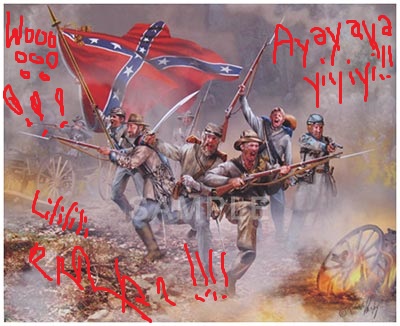
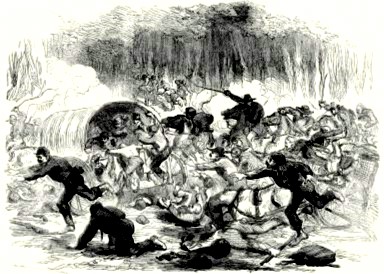 And yet, things remained relatively calm. Disorderly, to be sure – frustrating, and volatile. But there was no panic – at first.
And yet, things remained relatively calm. Disorderly, to be sure – frustrating, and volatile. But there was no panic – at first. 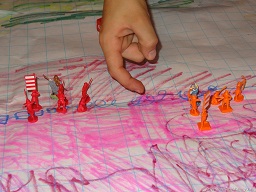 Your standard American History textbook will tell you the Union realized the War was going to be a bit trickier than they’d thought, and begin preparing more substantially. The South, on the other hand, felt validated in their assessment of the Yanks and suffered from overconfidence.
Your standard American History textbook will tell you the Union realized the War was going to be a bit trickier than they’d thought, and begin preparing more substantially. The South, on the other hand, felt validated in their assessment of the Yanks and suffered from overconfidence. 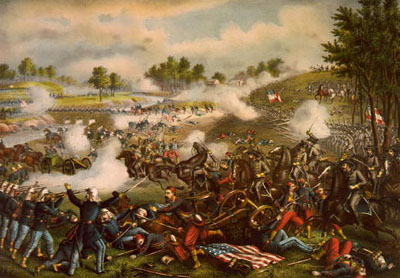
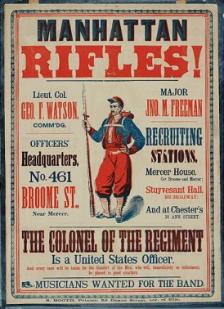 After Sumter, the Union called for soldiers from the loyal states, some of whom actually sent them. Generals were often elected by their men or appointed for their political connections, so knowing what you were doing wasn’t really top priority at this stage. Men signed up eagerly for the good times to come – war was a mostly theoretical adventure, and defeating the silly South would be good times.
After Sumter, the Union called for soldiers from the loyal states, some of whom actually sent them. Generals were often elected by their men or appointed for their political connections, so knowing what you were doing wasn’t really top priority at this stage. Men signed up eagerly for the good times to come – war was a mostly theoretical adventure, and defeating the silly South would be good times. 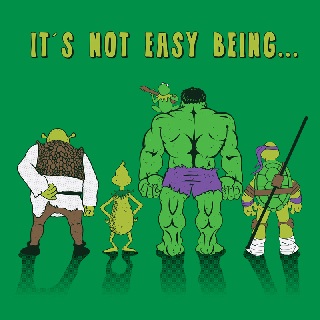 President Lincoln appointed Irvin McDowell to make this happen, but McDowell was skeptical about the supposed ease of such a mission. He’d done real war before, and was concerned about trying to send men into battle based on the harassment of impatient politicians and newspapers. He was famously reassured by President Lincoln, “You are green, it is true, but they are green also; you are all green alike.”
President Lincoln appointed Irvin McDowell to make this happen, but McDowell was skeptical about the supposed ease of such a mission. He’d done real war before, and was concerned about trying to send men into battle based on the harassment of impatient politicians and newspapers. He was famously reassured by President Lincoln, “You are green, it is true, but they are green also; you are all green alike.” 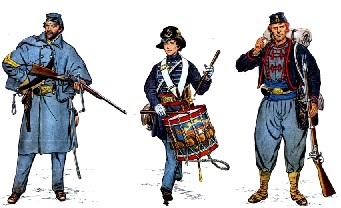
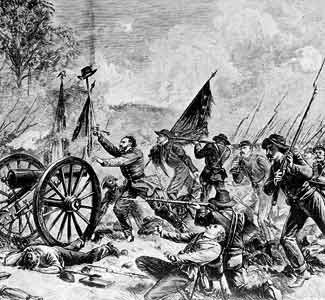 Unfortunately P.G.T. Beauregard, our friend from the attack on Ft. Sumter, was waiting for him just outside of Richmond. He had a plan as well, once the Yankee oppressors arrived – fake to the right, attack hard on the left, flank the enemy. Once between the army and the capital, they’d have no choice but to surrender. War over – here comes the honor and the glory (and let’s use some discretion regarding the ladies).
Unfortunately P.G.T. Beauregard, our friend from the attack on Ft. Sumter, was waiting for him just outside of Richmond. He had a plan as well, once the Yankee oppressors arrived – fake to the right, attack hard on the left, flank the enemy. Once between the army and the capital, they’d have no choice but to surrender. War over – here comes the honor and the glory (and let’s use some discretion regarding the ladies). 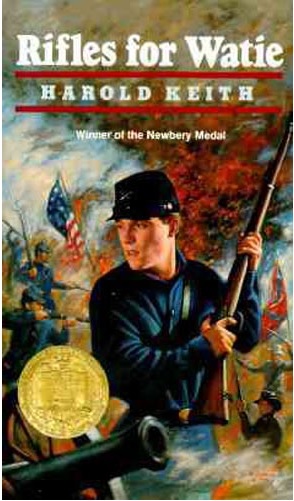 People were getting SHOT! IN THE BODY! Cannonballs were tearing off limbs, and bullets were splattering the brains of friends. Many bowels and bladders were emptied in those opening hours, and shame quickly gave way to survival instinct for some as this glorious adventure turned out to suck majorly. This was NOT GLORIOUS AND WHAT THE HELL THEY’RE TRYING TO KILL US ALL!
People were getting SHOT! IN THE BODY! Cannonballs were tearing off limbs, and bullets were splattering the brains of friends. Many bowels and bladders were emptied in those opening hours, and shame quickly gave way to survival instinct for some as this glorious adventure turned out to suck majorly. This was NOT GLORIOUS AND WHAT THE HELL THEY’RE TRYING TO KILL US ALL!